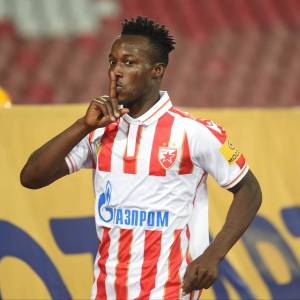Ghana take on Madagascar at the Baba Yara Sports Stadium in a 2026 FIFA World Cup qualifier on Friday. Ghana are comfortably the favourites to win this Group I fixture, but Romuald Rakotondrabe's side are notably pragmatic, dogged and determined.
Claiming all three points will be massive for the Black Stars to get up and running early on, putting nerves to bed and easing some pressure off of Hughton's shoulders after some recent torrid displays from a team winless in two matches.
Here are three key areas where this game can be won and lost for Ghana and Madagascar.
The Importance of Kudus
Regarding Friday’s opponents, Kudus will be vital to helping Hughton's side break through Madagascar during attacking transitions. The West Ham midfielder is unbelievably quick for a central midfield player which is one of the reasons why Kudus was shoehorned out to the attack upon arrival at Ajax.
On top of this, he is explosive on the ball and is able to burst through pressure from onrushing defenders, beating them with his exceptional dribbling. For the most part, Kudus' wonderful dribbling won’t be overly helpful for Hughton's Ghana in this match due to Madagascar being likely to sit back and soak up pressure.
However, there will be times when Madagascar are forced to come out and be a little more expansive with their play. When these moments occur, Kudus will be vital for hitting the East Africans on the break. Being on the backfoot against a counterattack is one area where Madagascar have really struggled under Rakotondrabe.
The manager is keen for his side to counterpress upon losing possession, bunching together to regain the ball and stopping the opposition’s counter as far up the pitch as possible. Unfortunately, this has left the side exploitable at times once the initial counterpress is broken.
Counterpressing is when a team hunts down the ball in packs in a structured manner as soon as possession is turned over to the hands of the opposition. Plenty of sides in the modern game counterpress. The likes of Jurgen Klopp and Pep Guardiola revolutionised the football over the last decade by integrating fascinating methods of this into their tactics.
The key factor for this to be a success is having energy in the midfield. But. Rakotondrabe's midfield do not have the energy to sustain this momentum throughout the game. Counterpressing will be more difficult due to this. This is where Kudus can tear them to shreds, using his explosive speed and dribbling to bypass midfield pressure and beating the counterpress to leave the defensive line vulnerable.
Be bolder
This far into Chris Hughton's tenure, Ghana should be further along in their evolution. It would not be prudent to judge on individual results - especially one as bad as USA - but the fallout from that woeful performance is pertinent. It speaks to a lack of identity under Hughton.
That isn't to say every display has been devoid of ideology, but it's hard to pinpoint exactly what Hughton's playing philosophy is. The harsh reality is that Ghana were (and continue to be) too cautious - the approach was not brave enough. And not for the first time, Hughton was too slow or unwilling to gamble on changes.
Is it unfair to say Hughton's achievements - which warrant merit - look better against a backdrop of consistently underachieving managers? Perhaps.
Ghana's squad is packed full of young, vibrant, attacking talent, and while that doesn't necessarily guarantee success, the right mix of personnel should at least mean more goals. More excitement. Bigger threat.
There is no question Hughton should lead Ghana to the next AFCON. He has more than earned that right. But there is an expectation associated with Ghana's chances now, which must be lived up to. Ghana fans have had a taste of tournament success and they are hungry for more. The relationship between the Black Stars team and its supporters peaked against the Central African Republic and Hughton - integral to that process - must ensure that is maintained.
Certainly, he needs to be bolder in his selection and style. Of course there is also a need to strike the right balance, but Ghana have such an abundance of strength in forward areas - creative talent should be utilised to better effect. Rarely does the quality of opposition call for a back seven, including two holding midfielders, for example.
He's whetted the appetite, now he needs to deliver.
Play between the lines
Iran are really well-drilled under Rakotondrabe which is a testimony to the manager as well as his predecessor Nicolas Dupuis.
Defensively, Madagascar press high up the pitch, especially against opponents of a similar or lesser quality. But in games versus better opponents, Madagascar usually drop into a low block.
This is to ensure the distance between the backline and the goalkeeper is minimal to prevent the attacking side from playing to runners in behind the defence
Rakotondrabe has set his players up in a 4-3-3 so far during his brief stint. When they defend, this drops into a 4-1-4-1 as the wingers fall back to the midfield line. Madagascar play a deep line with two banks of four and an extra defender between the lines
That’s not to say Madagascar are impossible to break down, far from it. The team still have flaws during games that can be exploited. One of the keys to breaking down a low block is to get the ball into space between the lines as teams can create better chances centrally than out wide.
Playing through a block like this requires a high level of technical competency, something Ghana have in abundance with players such as Majeed Ashimeru, Osman Bukari, Mohammed Kudus and Abdul Fatawu Issahaku.
Madagascar struggle when the attacking side quickly plays the ball between the lines and the lack of energy in the team rears its ugly head as the players are unable to get to the ball fast enough to intercept passes.













